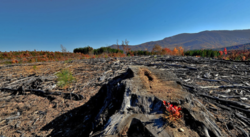Lawsuit targets carbon-pollution exemption for wood-burning power plants
 Conservation groups filed a lawsuit yesterday challenging the Environmental Protection Agency's exemption of wood-fired power plants and other biomass incinerators burners from carbon-dioxide pollution limits under the Clean Air Act for the next three years while it studies the issue.
Conservation groups filed a lawsuit yesterday challenging the Environmental Protection Agency's exemption of wood-fired power plants and other biomass incinerators burners from carbon-dioxide pollution limits under the Clean Air Act for the next three years while it studies the issue.The groups that filed suit -- Georgia ForestWatch, Wild Virginia, the Center for Biological Diversity, Conservation Law Foundation, and the Natural Resources Council of Maine -- point out that the issue is especially important for the Southeast, known as the "fiber basket of the nation." Utilities and independent power producers across the region are moving forward with dozens of large wood-fired plants.
"The South is already seeing a huge uptick in the number of new and retrofitted facilities that will burn woody biomass, which will create increasing pressure to cut native, standing forests for fuel," says Frank Rambo of the Southern Environmental Law Center, which is representing Georgia ForestWatch and Wild Virginia in the lawsuit. "While certain types of biomass must be part of our nation's move to clean, sustainable energy sources, science shows that cutting whole trees often adds to the carbon output."
The groups are concerned that demand for wood fuel from existing and proposed plants could outstrip the supply of available wood waste, leading to the cutting of standing trees. In Georgia, for example, plans are underway to construct a 56-megwatt biomass power plant in Laurens County
While burning wood doesn't release any more carbon dioxide to the atmosphere than its eventual biodegradation, incineration releases the carbon dioxide at a much faster rate. The conservation groups worry that the near-term increase in carbon pollution will undermine efforts to curb emissions over the next several years and avoid catastrophic climate disruption.
In a rule released last year detailing how it would regulate greenhouse gases under the Clean Air Act, EPA treated emissions from burning biomass just like emissions from burning fossil fuels. But industry groups challenged that equal treatment, leading the same five conservation groups that filed yesterday's lawsuit to intervene in defense of the EPA's position. That suit is still pending.
In the meantime, though, EPA granted an industry petition to reconsider the rule, leading to another challenge from the conservation groups. EPA went on to grant the industry the three-year exemption from the rule in January, with Administrator Lisa Jackson saying the agency was "working to find a way forward that is scientifically sound and manageable for both producers and consumers of biomass energy."
The regulatory deferment was praised by the National Alliance of Forest Owners, an industry group representing private forest owners. NAFO President and CEO David P. Tenny called the move "a prudent step towards restoring the federal government's long-standing policy that biomass energy is an environmentally beneficial alternative to fossil fuels."
NAFO's members include timber giants such as Plum Creek Timber and Weyerhaeuser, respectively the world's largest and second-largest private-sector owners of softwood timberland. According to the Center for Responsive Politics' OpenSecrets.org database, the PACs for Weyerhaeuser, Plum Creek and NAFO together spent over $850,000 in the 2010 election cycle alone.
The conservationists involved in the lawsuit point to the industry's clout as a possible factor in the decision to grant the exemption.
"The EPA has no authority to just waive the Clean Air Act for the benefit of politically favored industries, as it has for the forest products and bioenergy industries here," says attorney Kevin Bundy with the Center for Biological Diversity. "The science is clear: Burning our forests for energy makes no sense as a strategy for dealing with climate change."
* CORRECTION: Georgia Power's project to convert Plant Mitchell to a biomass-fueled facility was formally delayed last year. Facing South regrets the error.
(Photo of a clear-cut forest in North Carolina by BillRhodesPhoto via Flickr.)
Tags
Sue Sturgis
Sue is the former editorial director of Facing South and the Institute for Southern Studies.
